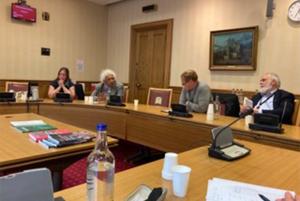
Peter Emerson from The de Borda Institute recently launched his book The Punters’ Guide to Democracy which explores democratic voting systems. The event was held in the Linen Hall Library in Belfast.
The Community Relations Council (CRC) supported the book launch event through its Small Grants Scheme.
The Punters' Guide to Democracy (Springer, Heidelberg) delves into the myriad ways of voting in a democratic system which, the author notes, is of great importance to the citizens of Northern Ireland.
“Many people think majority voting is the best, if not the only way, of making democratic decisions,” Peter said. “But even the Greeks of 2,500 years ago realised that, in a multi-option setting, there might be a situation where there is no one option which has majority support. So they invented rules which relied on binary voting, not least because that was the only known voting procedure in those days.”
It can be stated then, that since this time period, more accurate voting procedures have been developed.
“For a divided society like Northern Ireland to continue to use binary voting, even in its consociational format, is unwise,” Peter explained, “as we have seen with the use of vetoes in the Assembly and so on. The preferential points procedure, first invented by Cardinal Nicholas of Cusanus in 1433, would be more inclusive, and more accurate!”
Binary Decision Making
The use of binary decision making can potentially lead to increased division, both locally and globally, according to the author.
He explained: “My dad was Irish from Cork (and Protestant),while Mum was English from Cheshire (and Catholic). So asking me the binary closed question, ‘Are you British or Irish?’ is at least inadequate.”
This thinking can also be widened out to include some of the world’s current crises.
“Likewise the question, ‘Are you Serb or Croat?’ ignored or even disenfranchised all who were partners in or the children of a mixed relationship, as well as those who wanted a compromise ... and those campaigning for peace. That question started a war,” Peter said. “In fact, ‘All the wars in the former Yugoslavia started with a referendum,’ (Oslobodjenje, 07/02/99, Sarajevo's famous newspaper).
“The same quotation now applies to Ukraine, with the 2014 referendums in Crimea, Donetsk and Luhansk, which was also the year of Scotland's referendum. Little wonder, then, that the word Shotlandiya was used by Russian separatists to 'justify' the unjustifiable: the violence that is now destroying Ukraine.”
Pluralism is possible
So, what might a good alternative to the current voting system look like?
“Pluralism is possible,” Peter stated. “In a six-party Stormont, there might be (up to) six options 'on the table.' In debate, these options may be tweaked, amended, composited or even deleted... but only if the original proposer(s) agree to such a change. So the number of options may vary. If that number boils down to a singleton, it may be regarded as the consensus. If not, the Speaker may draw up a ballot to represent those options still on the table, and the MLAs could then cast their preferences, at best to identify the option with the highest average preference. And an average, of course, involves every MLA, not just a (simple or weighted) majority of them.”
The House of Lords
Peter has recently been to London (UK) to give a talk on decision-making in the House of Lords in an event chaired by Lord Meghnad Desai. Invitees to the event included NIO, the Irish Embassy, and various NGOs such as the Electoral Commission and ERS.
“If democratic decision making were to be based,” Peter began, “on such a preferential points system of voting – the modified Borda count (MBC), to give it its technical term – there would be no (further) justification for majority rule. Instead, in every democracy, governance could be based on all-party power-sharing.”
This idea of power sharing is especially apt given recent global events, such as the Covid-19 pandemic and Climate Change, which would indicate that cooperation is imperative.
“Covid and Climate Change are telling us all to cooperate,” Peter explained. “The nations of the world are hoping to do so, and the COP gatherings are trying to work without majority voting. Political parties should also be trying to work together, if only for the sake of the survival of our species.”
The Punters' Guide to Democracy is available for purchase
About The de Borda Institute
The de Borda Institute aims to promote the use of inclusive, multi-optional and preferential voting procedures, both in parliaments/congresses and in referendums, on all contentious questions of social choice.
Read more about The de Borda Institute